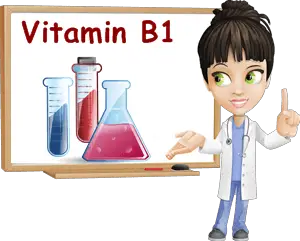Thiamine or vitamin B1 is an important member of the B vitamin complex or B vitamin group. Thiamine or vitamin B1 supports the activity of the nervous system, particularly the learning process. During prolonged learning sessions or stressful periods of time, our brain makes use of significant amounts of thiamine which means our demands of the nutrient may increase significantly. Very often, the medical community recommends taking vitamin B1 supplements in order to fulfill the growing demands our brain issues during periods of intense activity.
In addition to this, vitamin B1 helps convert carbohydrates and proteins from the foods we eat into energy which our body uses in order to sustain a myriad of essential processes. Vitamin B1 is fuel for the human body. Children require an adequate intake of vitamin B1 to support both physical development and cognitive performance. Sportsmen, athletes and active people in general get their great muscle tone from a rich vitamin B1 diet. Stomach muscles and intestinal walls are the first to benefit from a good vitamin B1 intake.

Our brain, muscles, eyes and cardiovascular system also find support in a good vitamin B1 supplementation. Basically, if you want to think straight, learn faster, move better, be more active and feel like you are invincible, you need to get your thiamine. A well-thought diet, varied, balanced, containing sufficient food sources of vitamin B1 can meet one’s daily requirements of the nutrient, but when demands increase for various reasons, supplementation is recommended to prevent a deficiency.
Our body requires thiamine or vitamin B1 to perform fundamental physiologic processes. As soon as vitamin B1 enters the body, it is absorbed at the intestinal level and sent out to perform vital functions. What remains unused is not stored, but quickly gotten rid of through perspiration (or sweat) and with the help of our kidneys. Lentils, sunflower seeds, whole wheat bread, green peas and spinach are only a few generous food sources of thiamine.
Also see vitamin B1: thiamine, aneurine.
Need to know: every time you go to the bathroom you eliminate important nutrients such as vitamins and minerals. Because they are essential for the proper functioning of the body, it is imperative that these nutrients be replaced as soon as possible. The same happens with vitamin B1. Because we excrete vitamins and especially minerals, we should drink enough liquids to remain well-hydrated and not feel thirst, but not beyond this point. Drinking more liquids then we feel we need just to comply with general recommendations that do not apply to everyone may prove counterproductive by favoring nutrient deficiencies.

Even more, smoking and eating great amounts of sugar can quickly deplete your body of vitamin B1, so it is best to at least cut down on cigarettes if you are a heavy smoker and reduce your sugar intake or switch to fruits and even dark chocolate if you have a sweet tooth (and keep intake reasonable, of course). But what is vitamin B1 (thiamine) good for? Find out below what are the top 5 functions and benefits of vitamin B1 (thiamine).
What are the benefits of vitamin B1?
Ensures adequate energy levels
Vitamin B1 is responsible for the conversion of carbohydrates and proteins into energy. The resulting energy is then used by the brain, heart, lungs, kidneys and so on to perform specific tasks. To be more exact, vitamin B1 converts the food we eat into a special kind of fuel that our organs can use.
Supports cardiovascular health
Vitamin B1 helps produce acetylcholine, a neurotransmitter that sends messages to both muscles and nerves. Vitamin B1 deficiency leads to a decrease in acetylcholine production which disturbs the communication between the brain and muscles and nerves. This may lead to conditions such as extrasystoles (extra heart beats) or, when there is a severe vitamin B1 deficiency, congestive heart failure.
Benefits for vision and eye health
According to research, vitamin B1 works together with essential fatty acids Omega-3 and Omega-6 to offer protection against cataract and other eye-related conditions. Other eye-friendly nutrients include vitamin A and the antioxidants beta-carotene, lutein and zeaxanthin.
Improved brain function
Vitamin B1 helps improve both memory and concentration and helps strengthen nerves. An adequate intake can relieve stress damage to the brain and improve overall brain function significantly. Even more, it would appear that thiamine can slow down the progression of Alzheimer’s disease, cirrhosis of the liver and reduce the severity of some types of infection.
Benefits for the nervous system: myelin sheath development
The myelin sheath is a layer around the axon, which is the tail of a neuron (nerve cell). Axons help transmit information from one neuron to another and the myelin sheath is meant to improve connection. Vitamin B1 is what keeps the myelin sheath healthy and functional. Myelin loss due to vitamin B1 deficiency basically leads to a bad connection and nerve impairment. Extremely severe damage to the myelin sheath may lead to debilitating medical conditions.
Vitamin B1 deficiency symptoms
Severe vitamin B1 (thiamine) deficiency is the leading cause of a life-threatening condition called beriberi. Signs and symptoms of beriberi include: severe neurological disorders, psychiatric manifestations, weight loss, sensory-motor degradation and even death. Overall, vitamin B1 is of crucial importance for a healthy brain and a healthy body and a varied and balanced diet consisting of foods rich in thiamine such as grains, fish, meat, seeds, legumes, fortified breakfast cereals should easily meet daily requirements of the vitamin.
